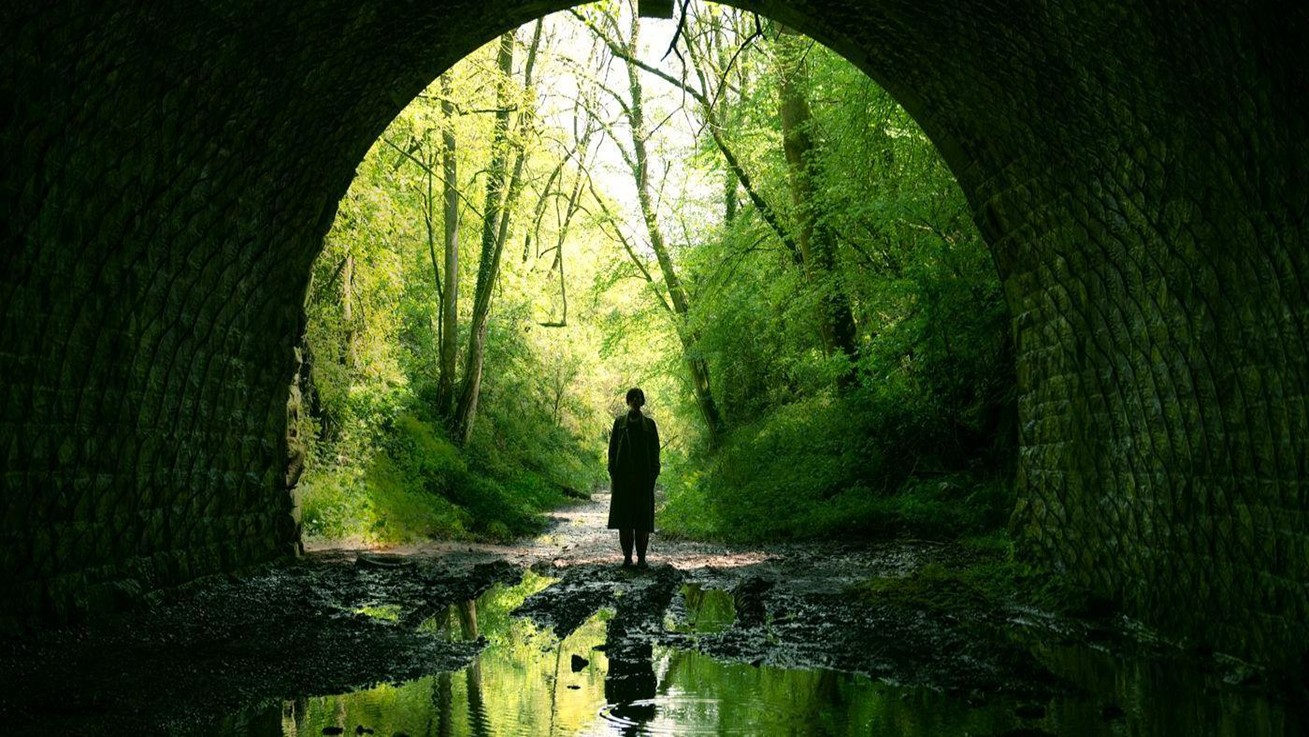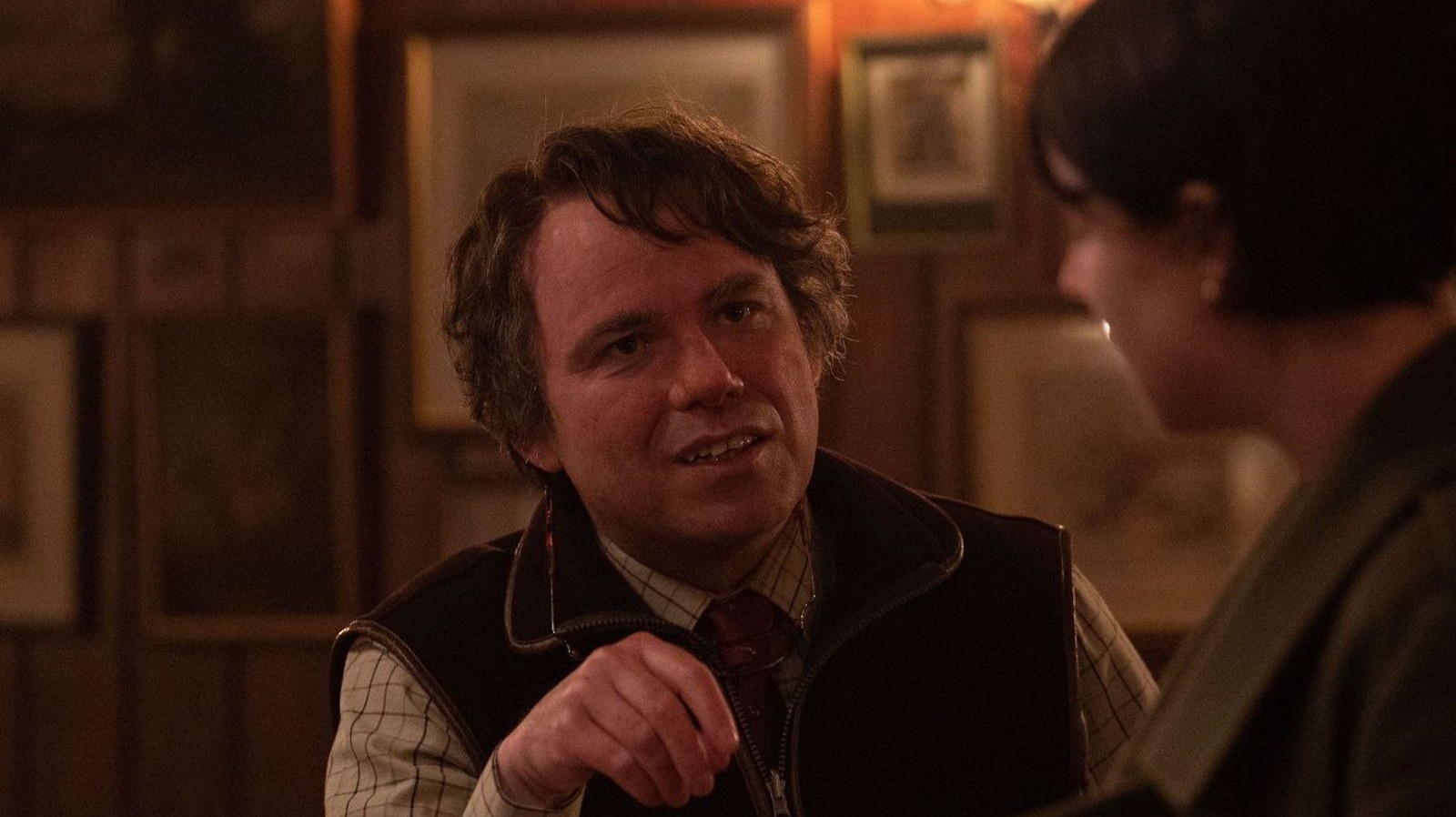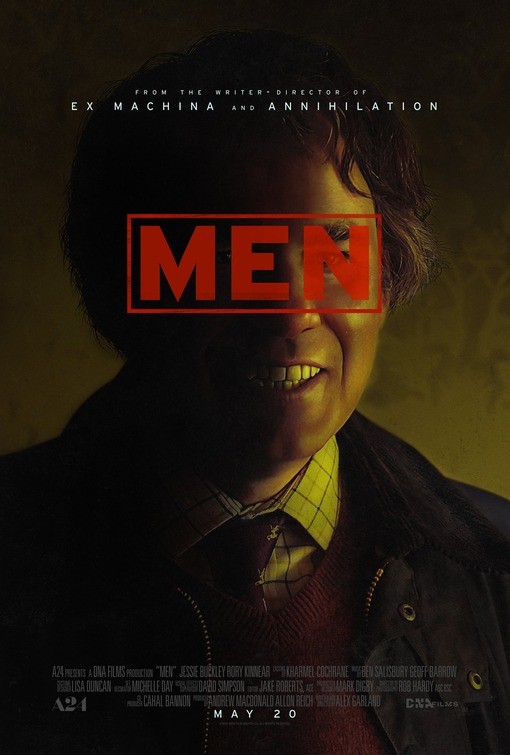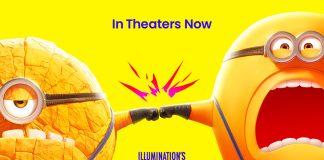Men is an unnerving satire in the guise of an allegorical horror film from writer/director Alex Garland. But while the title may be simplistic and may seem controversial, the film’s approach smartly leaves its ideas open to interpretation.
Alex Garland has made a name for himself in the realm of science fiction. His directorial debut investigated the birth of an artificial intelligence, Annihilation followed humanity’s first contact with an extraterrestrial entity, and Devs questioned the ability of computers to predict the future. His latest film is Men, which is not a science fiction film at all. However, it works as a fitting extension of his type of speculative fiction.
The difference with Men compared to Garland’s previous work is the fact that he is not asking about what if, more so he is asking what is. As the title suggests, he frames his question in regards to the male condition. At its most obvious it is a criticism of toxic masculinity, but it also works in the abstract to examine the domination of men upon society throughout history. This works especially well in contrast to the film’s female protagonist, against whom these “men” rely on to justify their (terrible) behavior.
Men
Directed By: Alex GarlandWritten By: Alex Garland
Starring: Jessie Buckley, Rory Kinnear
Release Date: May 20, 2022
As you might be able to surmise, the specific title and the intended approach of the film has stirred up a sizable controversy amongst a certain crowd. Internet trolls will argue that the film’s negative depiction towards men demonstrates a conspiracy against all males. But the deep-seated origins of that type of outrage is exactly the type of difficulties the film’s protagonist struggles against. It examines the way self-centered thinking has been promoted and ingrained into traditional expectations for the male gender. It isn’t a cautionary tale as much as it is an artistic representation of male privilege, but played out in a surreal nightmarish fairytale.

While Garland’s films have always focused upon female perspectives, I would argue that Men isn’t necessarily pushing a feminist agenda unless you want it to. Maybe the simplistic title suggests that the depiction of men in the film is meant to cast a negative umbrella over all of them. But assigning such simplistic views upon a film that has a limited amount of time to convey its message is short sighted and prejudiced. The film purposefully leaves a lot of its ideas open for interpretation, and that allows the viewer to make their own assumptions about what they are watching. The negative opinions one might conclude are as much a statement about the viewer as the film itself.
The protagonist is Harper, a woman who had just experienced the tragic death of her husband. She was in the process of getting a divorce from him, and he began acting out and making threats against her before he was killed. Looking to get away from it all, Harper rents a house in a village in the country to try and unwind. On a walk in the forest she encounters an unsettling man who stalks her. When she seeks help from others in the village they are dismissive and rude towards her. As she continues to have more encounters with the citizens of the village she comes to realize a shocking truth behind their behavior.
Without giving too much away, I will say that the connection Harper stumbles upon is at least somewhat related to the myth of the Green Man. The Green Man is a symbol found in many cultures spanning back millennia, and is incorporated into everything from religious imagery to architectural design. Our modern interpretation of The Green Man is that he is a representation of rebirth, specifically the return of foliage in the spring after winter. Imagery associated with this interpretation is shown throughout the film, and becomes the basis for a shocking body-horror type twist at the end.
The rebirth theme is an important one to the context of Men for several reasons. First of all it represents a return from dormancy. It isn’t suggesting all men are susceptible to the vindictive behaviors demonstrated in the film, but instead that this type of behavior can be brought out as a result of trauma. It’s the idea that the common response to the experience of pain is retribution. Look at the themes and stories of our most popular films and books. The problem is this frustration is often directed externally instead of dealt with on a personal level.

Rebirth is also important because it represents the lead character herself. She is trying to begin her life again, but the type of problems she dealt with before are recurring in a new way. Furthermore the trauma she experienced is something that she will always have to live with. There are all of these stray comments by other characters which force her to face those fears over and over again. The Green Man is the repetition in our lives, but it also represents something more sinister.
The behavior of the antagonists in this film is quite literally self-propagating. It feeds off of itself over and over again. The film also makes a profound statement about this type of behavior existing in all walks of life and society. The people in places of power, the people we are supposed to be able to trust, even those who seem to be well-meaning can potentially act in a way that belittles others to their own advantage.
All of this means that the horror aspect of Men is both highly effective and different than we have seen in other psychological horror films. It works because it’s the kind of daily garbage we wade through on social media, but birthed in flesh and blood. We might be used to reading about it, but Garland makes us confront it head-on. It works because it isn’t simply giving life to those behaviors for the sake of making a socially-informed statement, it is commentary on social trends highlighted in an almost satirical manner.
The way the film brushes up to reality does create a sense of familiarity. The behavior of the male characters isn’t really all that surprising once you realize the direction the film is intending to take. This makes it less frightening than it could be, but the advantage is the ability of the film to use that terror in the framework of a real world issue. The film isn’t trying to create something to scare your pants off, it’s saying this type of thing is going on in the world right now. More importantly there’s the conclusion that we can’t really do much about it. That is the film’s most chilling realization.
In other words, like all satire there is truth in the exaggeration. The exaggeration part is where the film’s creativity can be commended. First it starts with the way the antagonists are portrayed. To bring a commonality to their behavior, and to fit them with the film’s title, all but one of the male figures in the film is portrayed by Rory Kinnear. The faces don’t always work perfectly, but it kind of aids the unsettling nature of the film. I also appreciate how the film holds the final truth close to its chest until the final climax. Not that it necessarily keeps you from guessing, but it does make you wonder if Harper is experiencing some sort of hallucination.

That fine line the film walks between realistic and surreal is really what makes it so effective. Things start off slowly and unassuming. You question a visual or a slightly rude comment. But over time it builds on itself over and over. It just keeps getting worse. It’s as if someone says something and at first you aren’t sure if they meant it to be malicious so you continue to be courteous, only to realize the person’s real nature later on. That’s the dilemma we all face in the midst of this behavior on a daily basis. This type of thing is so far ingrained into our societal expectations that it is very difficult for us all as a species to improve.
Beyond the connections with the Green Man and the discussion on the male archetype, the film is chocked full of other imagery and ideas. There are religious allegories, references to horror tropes, and allusions to the supernatural. Where the story and approach of the film is rather straightforward and direct, it actually has a lot going on below the surface. But because the film doesn’t exactly explore its background influences, audiences can simply ignore them and doing so opens the opportunity for the film to be misinterpreted and feel one-dimensional. Still, there is enough here to make for a thrilling, and topical horror movie experience.















